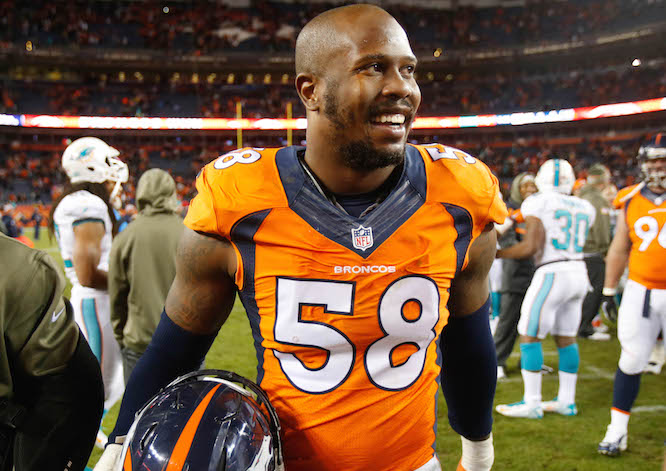Two years ago, Von Miller was center stage at the beginning of training camp, getting grilled by the gathered media about the suspension that he’d been slapped with by the NFL. Following multiple failed drug tests, as well as an ill-fated attempt to avoid detection by corrupting the league-appointed urine collector, the linebacker was told he’d miss the first six games of the 2013 season.
As a result, the normally joyous opening day of camp turned into a clunky version of “A Few Good Men,” with media members trying to goad Miller into admitting that he had a problem with marijuana. It was an ugly display, one that didn’t make anyone in attendance – the player, the team or the reporters looking for a story – look particularly good.
But it did provide plenty of fodder for columnists, sports talk hosts and everyone else with a forum. Universally, Miller was ripped for letting down his teammates, risking his career and being unbelievably irresponsible.
At the time, all of those criticisms were fair. After all, the Broncos would have a hard time replacing their best pass rusher and being only one strike away from a permanent ban from the NFL (with the chance to apply for reinstatement after one year) would cost Miller millions once his rookie contract was completed. He had acted in a foolish, careless and reckless manner.
So the front-page stories were justifiable. The scathing commentaries were warranted. And the on-air rants were hard to argue against.
The problem, however, is that the mob who is quick to gather and throw stones when an athlete missteps is rarely anywhere to be seen when he or she finds redemption. Those who point a self-righteous finger at the fallen star, grandstanding for the masses while taking the moral high ground, are typically nowhere to be found when the story moves in the opposite direction.
Sports fans in Colorado know this all too well. More than a decade ago, a so-called recruiting “scandal” in Boulder provided all kinds of opportunities for people to get on their high horse in an attempt to gain some form of notoriety. When the story fizzled, after ruining the careers of many attached to it, no one was screaming about it from any mountaintop.
In February 2004, Ken Salazar held a press conference when it was announced that governor Bill Owens had named him as a special prosecutor to look into allegations of wrongdoing by the University of Colorado football team. Three months later, the state’s attorney general issued a statement to let everyone know that no charges would be filed following a “thorough review” of the case.
The first event wound up on the front page of the Denver Post. The second news item was buried somewhere between the horoscopes and Sudoku puzzles. It’s why to this day a misperception remains about what really went down at CU.
And it’s why everyone should avoid making the same mistake with Miller. While it was certainly fair to criticize him 24 months ago, those who led the charge on that front need to be equally as vocal in praising the linebacker now.
This weekend, it was revealed that Miller was released from the NFL’s drug program. After two years of passing tests, he no longer is one misstep away from being out of the league – whether on a temporary or permanent basis; Miller has a totally clean slate, no different than a zero-time offender in the NFL’s eyes.
The importance of this can’t be overstated. For the Broncos, the possibility of losing their best defensive player at any moment no longer looms overhead. And for Miller, a mega-contract like the ones signed by other elite pass rushers is now a foregone conclusion at some point.
But those are just the direct benefits of the news; they’re the football and financial advantages of avoiding trouble. The positives, however, run much deeper, as they are signs that a young man with unlimited potential avoided a fate that far too many talented athletes have met; Miller has been able to mature before it was too late.
Cynics will scoff that it’s only been two years; they’ll chortle that they could put down the bong if a $100 million contract was at stake. And to some extent, they’ll be correct.
But just once, can’t we all heap praise upon someone with the same fervor that we hurl criticism? Can’t we cheer just as loudly as we jeer?
Let’s not bury the fact that Von Miller has turned his life around. Let’s fill page one with that news, too.



